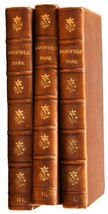| Clutching My Pearls is about Jane Austen and the times she lived in. Austen engaged with many of the same topics and issues that other novelists of the long 18th century wrote about, including the topic of female education. Click here for the first in the series.
|
 Suggested by Lady Catherine herself!
Suggested by Lady Catherine herself! Though their household is in chaos, the Prices still cling to the appearance of gentility. Pouring and serving the tea is genteel, carrying in the tray and heating the water is not. We recall as well how Mrs. Bennet is offended when Mr. Collins supposes that one of her daughters had a hand in preparing the dinner she served him. Financial disaster stalks the family if Mr. Bennet dies, but Mrs. Bennet wants the world to know that her daughters don't know how to cook. On the other side of the coin, Austen holds Lady Catherine De Bourgh up to ridicule for her vulgar interference in the minutia of Mrs. Collins' housekeeping. Such details should be beneath her notice.
The novels and conduct-books of the day were unanimous in agreeing that all young women should have some education in how to run a household, even if they never had to do any of the common household chores, and many warned that a genteel education which stressed accomplishments might be useful for the season of courtship, but it was a poor preparation for married life...





 RSS Feed
RSS Feed